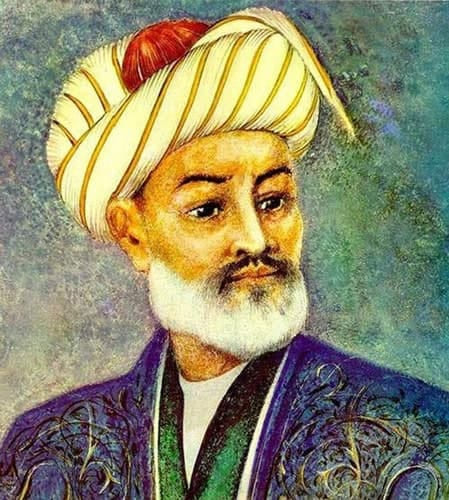Alisher Navoi was born in 1441 in Herat, a prominent cultural and intellectual center of the Timurid Empire. His full name was Nizam al-Din Mir Alisher, and he belonged to an aristocratic family with close ties to the Timurid court. His father, Giyath al-Din Kichkina, served as a high-ranking official, which allowed young Alisher to grow up in an environment of political and scholarly elites. From an early age, he was exposed to the rich cultural traditions of the Persian and Turkic worlds, which would later influence his literary and philosophical pursuits.
Herat during the 15th century was a flourishing hub of knowledge, art, and science, often referred to as the “Pearl of Khorasan.” The Timurid rulers, particularly Sultan Husayn Bayqara, promoted intellectual growth, attracting scholars, poets, and artists from across the Islamic world. Alisher Navoi received his education under some of the most distinguished scholars of his time, studying literature, history, calligraphy, and Islamic philosophy. He was fluent in multiple languages, including Chagatai (Old Uzbek), Persian, and Arabic, which allowed him to access a vast array of literary and philosophical texts.
From a young age, Navoi showed a remarkable talent for poetry and was deeply influenced by Persian poets such as Ferdowsi, Saadi, and Nizami Ganjavi. However, unlike many of his contemporaries who primarily wrote in Persian, he recognized the literary potential of the Chagatai language. This realization would later define his career, as he became the first writer to elevate Chagatai into a refined literary language, proving that it could match Persian in artistic expression.
During his youth, Navoi developed a close friendship with Sultan Husayn Bayqara, who would later become the ruler of Herat. This relationship would shape his life significantly, as he would go on to serve in the royal court and take on various administrative roles. However, despite his involvement in politics, his true passion lay in literature, philosophy, and the promotion of knowledge.
Navoi's early years were marked by intense intellectual curiosity and a deep appreciation for both Turkic and Persian literary traditions. The cultural and political atmosphere of Herat, combined with his privileged access to scholars and poets, provided him with a strong foundation for his future literary achievements. His early exposure to courtly life, combined with his keen observations of social and political dynamics, later influenced his poetry and philosophical writings, where he often reflected on themes of justice, morality, and human nature.
These formative years shaped Navoi into not just a poet, but a visionary thinker whose works would leave a lasting impact on Turkic and Persian literary traditions. His unique ability to merge poetic beauty with philosophical depth set the stage for his later masterpieces, making him one of the most celebrated literary figures in Central Asian history.

Alisher Navoi played a pivotal role in elevating the Chagatai language (the precursor to modern Uzbek) to a refined literary language. Before his time, Persian dominated the literary and intellectual landscape of Central Asia, and Turkic languages were often considered unsuitable for high literature. However, Navoi challenged this perception by demonstrating that Chagatai was just as expressive, sophisticated, and capable of conveying deep poetic and philosophical ideas as Persian.
Read MoreWhile Alisher Navoi is most renowned for his contributions to Chagatai literature, his influence extended beyond the Turkic world and deeply impacted Persian and Ottoman literature. Navoi was heavily inspired by Persian literary giants, such as Ferdowsi, Saadi, and Nizami Ganjavi, but he did not merely imitate them—he transformed and enriched their storytelling traditions.
Read MoreThroughout his works, Alisher Navoi presents a philosophical and ethical vision of an ideal society, where rulers govern with justice, wisdom, and moral integrity. His ideas on governance, social justice, and leadership are most vividly expressed in Mahbub ul-Qulub ("Beloved of Hearts") and Saddi Iskandari ("The Wall of Alexander").
Read MoreSufism, the mystical branch of Islam, had a profound influence on Alisher Navoi’s poetry and worldview. Many of his works explore Sufi themes such as divine love, spiritual enlightenment, and the journey of the soul toward God. Like Rumi and Attar before him, Navoi used metaphors and allegories to express deep mystical truths, making his poetry both poetic and philosophical.
Read MoreIn modern Uzbekistan and across Central Asia, Alisher Navoi is celebrated as a national hero and cultural icon. His works are studied in schools, his name is immortalized in universities, streets, and institutions, and his influence continues to shape Uzbek literature, language, and national identity.
Read MoreAlisher Navoi lived during the Timurid era (14th–15th centuries), a period of immense cultural and intellectual flourishing in Central Asia. The Timurid rulers, particularly Sultan Husayn Bayqara, were great patrons of the arts, and Herat became one of the most important centers of literature, science, and architecture in the Islamic world.
Read More